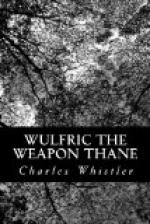Then one of the dame’s sons would go to London for me, there to seek Ingild and tell him of my hap, for, the lad said:
“Now that these Danes need fight no more they are decent folk enough, and will not hinder a man who has not whereof to be robbed.”
CHAPTER XIV. HOW WULFRIC AND RAUD SEARCHED TOGETHER.
I sat in the warm sun under the wide spread of the farmhouse eaves, dreaming my dreams with the dog at my feet, for so soon as the May time came in I must needs get into the open air, and grow stronger daily.
So it came to pass that one day up the green farm lane came a stranger, at whom the dog barked not, as was his wont, but ran to meet as if he were some well-loved friend. And it was Raud, his old master, who came, lightly mail clad, and with a short hunting spear instead of staff in his hand, and whistling his “Biarkamal” as ever.
Now with Raud I had no quarrel concerning the death of the king, for well I knew that what he had done was truly in mercy, nor had he taken any part in what went before. So I greeted him heartily enough, for all that with the sight of him came back to me, with a sharp pang, the memory of how I saw him last. And he rejoiced to see me again.
“I have half feared that I should find you gone,” he said; “for, when I heard of this from Hubba’s men, I must needs come and find you, and little hope had I that you would live.”
“I have nearly died, they say,” I answered; “but I think that I owe it to you that I was not slain in Hoxne woods yonder.”
“Why, not altogether,” he answered, sitting on the settle by me, and looking me over, from arm yet in sling to lame leg. “Some of the men with Ingvar and me wanted to slay you before they left that place; but Ingvar growled so fiercely that they must let you be, that they said no more, nor even would look your way again. But he himself looked at you, and said strange things to himself.”
“What said he?” I asked, wondering.
“He said, paying no heed to me, ’Now, Wulfric—you will hate me forever more, nor do I think that Lodbrok my father would be pleased with this;’ after which he spoke words so low that I caught but one here and there, but they were somewhat of the lady Osritha, our mistress. After that he said to me, ’Leave him horse and arms and unbind him,’ and then turned away. Yet if I had not bound you at first, maybe they would have had to slay you.”
“That is true enough,” I said; “surely I should have stood between you and the king. But what came to Ingvar to make him speak thus to me?”
“Why, after the hot fit comes the cold, ever, though Ingvar the King’s cold rage is worse at times than his fury. But since that day there has been somewhat strange about the king.”
“I wonder not,” I said; nor did I. “But how goes it with him?”
“Men say, though they dare not do so openly, that the ghost of Eadmund will not let him rest, and that mostly does he fear him when his rage is greatest. Many a time when the fury seemed like to come on him, Ingvar turns white and stares suddenly beyond all things, as though seeing somewhat beyond other men’s ken, and the sweat runs cold from his forehead. Many a man has escaped him through this.”




